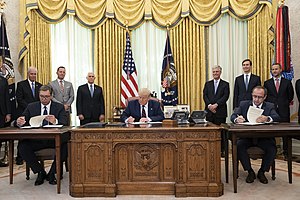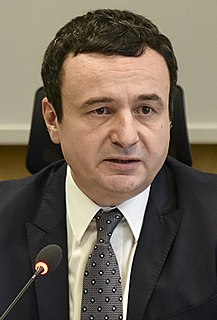
Albin Kurti is a Kosovar Albanian politician and activist serving as the prime minister of Kosovo since 22 March 2021, having previously served in that role between February and June 2020. He came to prominence in 1997 as the vice-president of the University of Prishtina student union, and a main organizer of non-violent demonstrations in 1997 and 1998. When Adem Demaçi became the political representative of the Kosovo Liberation Army (KLA), Kurti worked in his office. He has been member of the Assembly of Kosovo since 2010 in three consecutive legislatures.

Aleksandar Vučić is a Serbian politician serving as the president of Serbia since 2017 and as the president of the populist Serbian Progressive Party (SNS) since 2012.
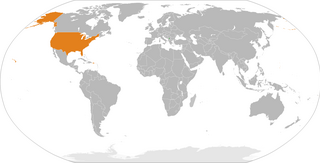
The United States officially recognized the Republic of Kosovo as a country, which declared independence from Serbia on February 17, 2008, the next day.
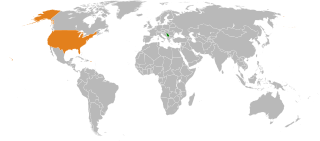
Relations between Serbia and the United States were first established in 1882, when Serbia was a kingdom. From 1918 to 2006, the United States maintained relations with the Kingdom of Yugoslavia, the Socialist Federal Republic of Yugoslavia, and the Federal Republic of Yugoslavia, of which Serbia is considered the legal successor.

Richard Allen Grenell is a political operative, diplomat, TV personality and public relations consultant who served as Acting Director of National Intelligence in President Donald Trump’s Cabinet in 2020. A member of the Republican Party, Grenell served as the United States Ambassador to Germany from 2018 to 2020 and as the Special Presidential Envoy for Serbia and Kosovo Peace Negotiations from 2019 to 2021.

Kosovo unilaterally declared independence from Serbia in 2008, a move which Serbia rejects. Serbia does not recognize Kosovo as an independent state and continues to claim it as the Autonomous Province of Kosovo and Metohija. Initially there were no relations between the two; however, in the following years there has been increased dialogue and cooperation between the two sides.
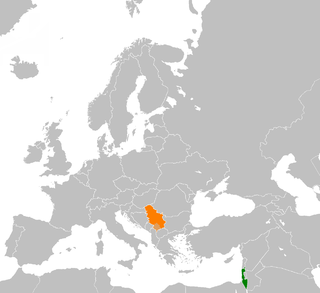
The diplomatic relations between Israel and Serbia were established on January 31, 1992, when Serbia was part of FR Yugoslavia. Israel has an embassy in Belgrade and Serbia had an embassy in Tel Aviv. Yugoslavia was the second country in Europe to recognize Israel in 1948. The two countries have economic and cultural ties, helped by a sizable community of Jews from the former Yugoslavia in Israel. Serbia agreed to move its embassy to Jerusalem on 4 September 2020 but decided not to after Israeli recognition of Kosovo as a sovereign state.
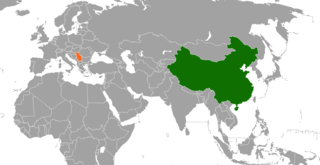
Sino-Serbian relations are foreign relations between the People's Republic of China and the Republic of Serbia. Relations have been maintained since SFR Yugoslavia's recognition of PR China on October 1, 1949, while diplomatic relations between the two countries were formally established by the exchange of diplomatic notes between the two Foreign Ministers on January 2, 1955. China has an embassy in Belgrade and also maintains an office in Priština based on consent of the Government of Serbia from November 2006. Serbia has an embassy in Beijing and a consulate-general in Shanghai. In 2017, Serbia and China mutually abolished the requirement of obtaining an entry visa for its citizens.

Serbian–Turkish relations are foreign relations between Serbia and Turkey. Serbia has an embassy in Ankara and a consulate-general in Istanbul. Turkey has an embassy in Belgrade. Both countries are full members of the Council of Europe, the Organization for Security and Co-operation in Europe (OSCE), the Central European Free Trade Agreement (CEFTA) and the Organization of the Black Sea Economic Cooperation (BSEC).
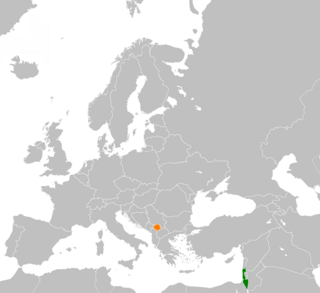
Israel–Kosovo relations refer to bilateral relations between Israel and Kosovo. Kosovo declared its independence from Serbia on 17 February 2008. Israel and Kosovo agreed on 4 September 2020, as part of negotiations for the Kosovo and Serbia Economic Normalization agreements, to mutually recognize each other. It was initially reported that the mutual recognition had not yet gone into effect at that point, and Israel's recognition of Kosovo was expected to be formally declared "in the coming weeks". However on 21 September the ambassador of Israel to Serbia, Yahel Vilan, confirmed that Israel had indeed recognized Kosovo on September 4, 2020. The two countries established diplomatic relations on February 1, 2021. On March 14, 2021 Kosovo officially opened its Embassy in Jerusalem.

The Palestinian–Serbian relations are bilateral relations between the State of Palestine and the Republic of Serbia. Relations between Serbia and Palestine have been very close and friendly. Even though Serbia had reestablished relations with Israel in 1991, its relations with Palestine still remain excellent.
The Belgrade–Pristina dialogue is a series of EU-facilitated talks between the governments of Serbia and Kosovo. Serbia claims Kosovo as its southern province under United Nations administration, and rejects its independence. Kosovo considers Serbia as a neighboring state. The negotiations began in March 2011, three years after Kosovo declared independence. They are the first negotiations between the two entities since Kosovo declared independence in February 2008.
The Brussels Agreement, formally the First Agreement of Principles Governing the Normalisation of Relations, is a treaty proposed to normalize relations between the governments of Serbia and Kosovo. The agreement, negotiated and concluded in Brussels under the auspices of the European Union, was signed on 19 April 2013. Negotiations were led by Serbian Prime Minister Ivica Dačić and Kosovo Prime Minister Hashim Thaçi, mediated by EU High Representative Catherine Ashton. The government of Serbia does not recognize Kosovo as a sovereign state, but began normalising relations with the government of Kosovo as a result of the agreement. Serbian president Aleksandar Vučić said in 2018 that the agreement is a difficult compromise for Serbia, which Vučić said had met all of its obligations.
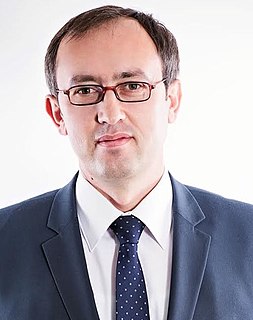
Avdullah Hoti is a Kosovan politician, who served as the Prime Minister of Kosovo from 3 June 2020 until 22 March 2021. He previously served as the Minister of Finance of Kosovo between 2014 and 2017 in the PDK/LDK coalition government.

Ana Brnabić is a Serbian politician serving as the prime minister of Serbia since 2017. She is the first woman and first openly gay person to hold the office.

The Open Balkan is an economic and political zone of three member states in the Balkans, including Albania, North Macedonia and Serbia. The zone has a total area of 131,935 km2 (50,940 sq mi) and an estimated total population of almost 12 million. The official languages are Albanian, Macedonian and Serbian. Its administrative centres are the cities of Belgrade, Skopje and Tirana. With the establishment of the zone, all three member states aim to increase trade and co-operation as well as improve bilateral relations.

The Bahrain–Israel normalization agreement, officially Abraham Accords: Declaration of Peace, Cooperation, and Constructive Diplomatic and Friendly Relations is an agreement to normalize diplomatic and other relations between Bahrain and Israel. The agreement was announced by President Donald Trump on September 11, 2020, and followed on from a joint statement, officially referred to as the Abraham Accords, by the United States, Israel and the United Arab Emirates (UAE) on August 13, 2020. It was formally signed on September 15, 2020, at the White House in Washington, D.C., and made Bahrain the fourth Arab state to recognize Israel and the second within a month.
The Israel–Sudan normalization agreement is an agreement that took place on October 23, 2020, whereby Israel and Sudan agreed that they will normalize relations. It is not clear if the deal establishes full diplomatic relations between the two nations. According to Axios reporting on March 10, 2021, "While Israel has presented Sudan with a draft agreement for establishing diplomatic relations, the Sudanese want an endorsement from the Biden administration." The agreement came after the agreements of Bahrain and the United Arab Emirates signed with Israel in September 2020. Unlike the latter two, Sudan had sent troops to fight against Israel in major Arab-Israeli wars and considered Israel an enemy state.

The Israel–Morocco normalization agreement is an agreement announced by the United States government on December 10, 2020, in which Israel and Morocco agreed to begin normalizing relations. On December 22, 2020, a joint declaration was signed pledging to quickly begin direct flights, promote economic cooperation, reopen liaison offices and move toward "full diplomatic, peaceful and friendly relations." Morocco officially recognized Israel in its communication to Israeli Prime Minister Benjamin Netanyahu.

The Kosovo–Serbia land swap is a proposed territorial exchange between Serbia and the partially recognized state of Kosovo to make their border run along ethnic lines. Initially rejected by the international community, the little progress made by the European Union-backed Belgrade–Pristina negotiations has brought the idea into greater consideration in the EU and also in the United States. The territorial exchange is generally discussed to involve a transfer of the Preševo Valley of Serbia with an ethnic Albanian majority to Kosovo and the pass of the majority ethnic Serb region of North Kosovo of Kosovo to Serbia. The cession of the Serbian municipality of Medvedja to Kosovo has also been proposed. This municipality, although with a considerable Albanian minority, is predominantly ethnic Serbian.
